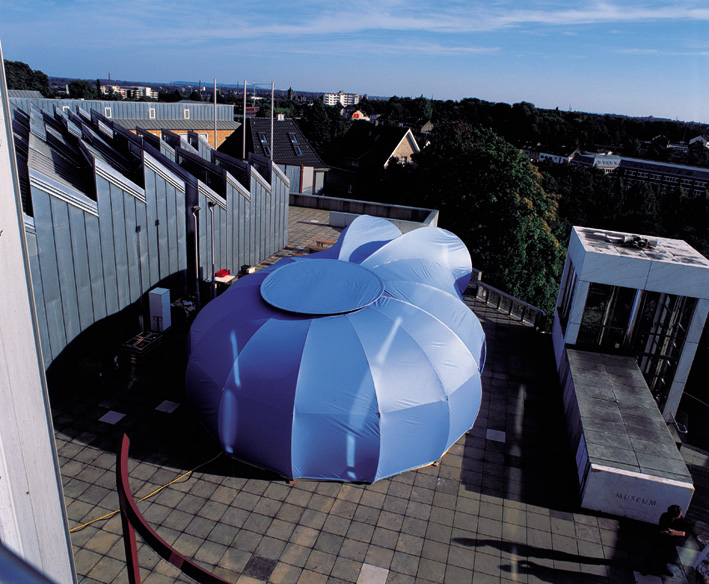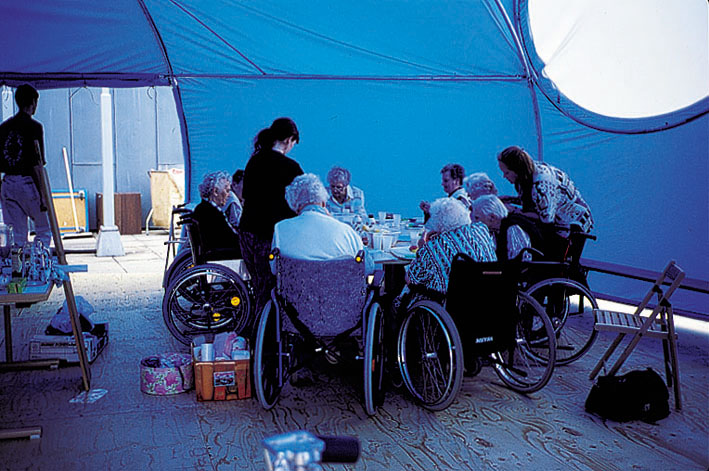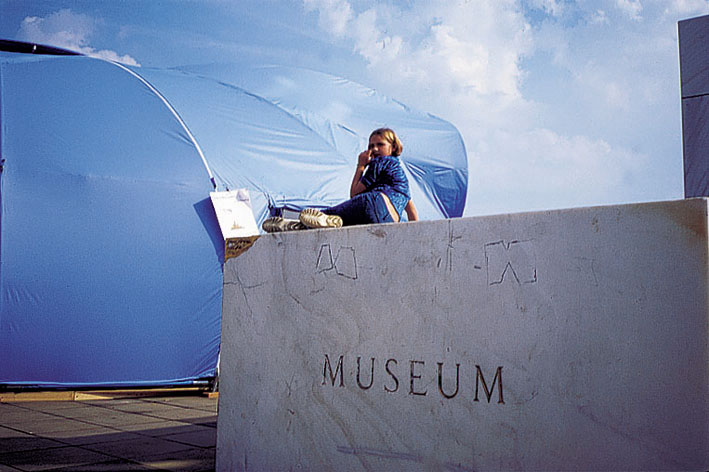Moenchengladbach , 1999
LONELINESS IN THE CITY
The events focused on visions of Paradise in daily life. With the help of the Social Holding, a relation was established with five elderly homes in the city. The inhabitants joined the programme in the pavilion, together with performance artists, sociologists, policemen and architects.
TRAVELLING PROJECT:
CBK DORDRECHT;
MUSEUM ABTEIBERG, MÖNCHENGLADBACH;
MACBA, BARCELONA;
KIASMA, HELSINKI;
MIGROS MUSEUM, ZURICH.
DONATED TO THE COLLECTION OF NMAC MONTENMEDIO, CÁDIZ
In Moenchenglandbach the theme was Near Paradise. With the help of the Social Holding, a relation was established with five elderly homes in the city. The inhabitants joined the programme in the pavilion, together with performance artists, sociologists, policemen and architects. The events focused on visions of Paradise in daily life. Does it exist only in the afterlife or is it here and now?
Loneliness in the City is a long-term research project about loneliness in modern urban life. For a number of years this theme played an important role in the work of Alicia Framis and has been elaborated on in several different forms.
For Loneliness in the City Framis collaborated with the artist Dré Wapenaar to design a mobile platform as the a-topical place where artists, architects and the public could develop and exchange ideas. The oval-shaped pavilion or tent of approximately 12×9 metres contains five sleeping cabins for the participants; the rest of the tent is public space. The pavilion is a research laboratory where ideas are investigated and immediately tested in reality. At the same time it is a community space to meet and relax. An intensive programme of workshops, performances, special video programmes, music and interactive events was organized for each city, to tie in with local issues and participants.
From Mönchengladbach to Dordrecht, to Barcelona, Helsinki and Zurich, insight into the general causes and corners of loneliness gradually grew and alternative strategies for interaction between people in the city were devised.
The programme in Dordrecht concentrated on creating a-topical places – places that do not have a preconceived or predefined function or purpose. The workshops ended up focusing on conquering or claiming space. A public place can become private or intimate by giving it new functions or meanings; conversely, a formerly private space can become a public one.
Guests:
Aceohale/performance group Brussels, Amsterdam
Sonia Alhauser/artist Moenchengladbach
Carlos Amorales/artist Mexico, Amsterdam
Otto Berchem/ artist USA, Amsterdam
Ralp Berger/artist Moenchengl
Probst Erlemann/clergymadbachan Moenchengladbach
Safi Etheiel/v.j.Berlin
Dora Garcia/artist Spain, Brussels
Voebe de Gruyter/artist Amsterdam
Head of Police/Moenchengbadbach
Una Henry/artist Ireland, Amsterdam
Mark Kremer/critic, curator Amsterdam
Veit Loers/director Museum Abteiberg Moenchengladbach
Gerard Polhuis/artist Amsterdam
Sabine Stenhoff/interior designer Berlin
Helmut Wallrafen-Dreisow/director Social Holding, Moenchengladbach



In Moenchenglandbach the theme was Near Paradise. With the help of the Social Holding, a relation was established with five elderly homes in the city. The inhabitants joined the programme in the pavilion, together with performance artists, sociologists, policemen and architects. The events focused on visions of Paradise in daily life. Does it exist only in the afterlife or is it here and now?
Loneliness in the City is a long-term research project about loneliness in modern urban life. For a number of years this theme played an important role in the work of Alicia Framis and has been elaborated on in several different forms.
For Loneliness in the City Framis collaborated with the artist Dré Wapenaar to design a mobile platform as the a-topical place where artists, architects and the public could develop and exchange ideas. The oval-shaped pavilion or tent of approximately 12×9 metres contains five sleeping cabins for the participants; the rest of the tent is public space. The pavilion is a research laboratory where ideas are investigated and immediately tested in reality. At the same time it is a community space to meet and relax. An intensive programme of workshops, performances, special video programmes, music and interactive events was organized for each city, to tie in with local issues and participants.
From Mönchengladbach to Dordrecht, to Barcelona, Helsinki and Zurich, insight into the general causes and corners of loneliness gradually grew and alternative strategies for interaction between people in the city were devised.
The programme in Dordrecht concentrated on creating a-topical places – places that do not have a preconceived or predefined function or purpose. The workshops ended up focusing on conquering or claiming space. A public place can become private or intimate by giving it new functions or meanings; conversely, a formerly private space can become a public one.
Guests:
Aceohale/performance group Brussels, Amsterdam
Sonia Alhauser/artist Moenchengladbach
Carlos Amorales/artist Mexico, Amsterdam
Otto Berchem/ artist USA, Amsterdam
Ralp Berger/artist Moenchengl
Probst Erlemann/clergymadbachan Moenchengladbach
Safi Etheiel/v.j.Berlin
Dora Garcia/artist Spain, Brussels
Voebe de Gruyter/artist Amsterdam
Head of Police/Moenchengbadbach
Una Henry/artist Ireland, Amsterdam
Mark Kremer/critic, curator Amsterdam
Veit Loers/director Museum Abteiberg Moenchengladbach
Gerard Polhuis/artist Amsterdam
Sabine Stenhoff/interior designer Berlin
Helmut Wallrafen-Dreisow/director Social Holding, Moenchengladbach